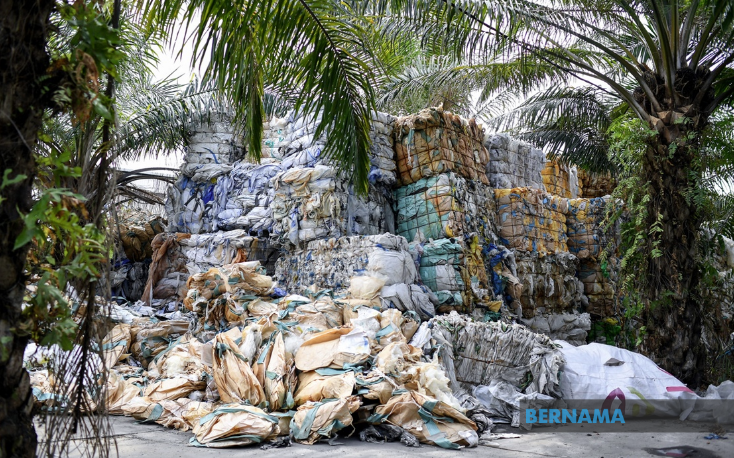
Opinions on a wide range of current issues from thought leaders, columnists and authors.

From :
Prof Madya Dr Haliza Abdul Rahman
According to researchers, plastic is estimated to produce 19 percent of global greenhouse gases by 2040, preventing the world from meeting Paris Agreement commitments to limit the average rise in Earth's surface temperature to 1.5 degrees Celsius, above pre-industrial levels. According to Inger Andersen, executive director of the United Nations Environment Programme (UNEP), the way plastics are produced, used and disposed of pollutes ecosystems, poses risks to human health and threatens climate stability.
Worldwide, one million plastic bottles are bought every minute, while up to five trillion plastic bags are used worldwide each year. Plastic production continues to grow, with half of all plastics produced designed for single-use purposes. About 36 percent of all plastics produced are used in packaging, including single-use plastic products for food and beverage containers. An estimated 85 percent of this plastic ends up in landfills or as uncontrolled waste. Roughly speaking, half of the disposed plastic is not properly maintained with most of it being dumped in the environment or burned.
In 2020, around 238 million metric tonnes of waste was single-use plastics such as discarded packaging and this is happening around the world. As a result, if there is no significant change, UNEP expects that each year, this plastic waste will reach 408 million metric tons by 2040. The results of global statistics found that five trillion plastic bags are used every year and 13 million tons of them are thrown into the sea. An estimated one million plastic bottles are bought every minute and 100,000 marine life are killed by plastic every year.
In Malaysia, it is estimated that an average of nine billion plastics are consumed by Malaysians each year, most of which end up in the oceans. In fact, data from a research paper published by Dutch academic Lourens JJ Meijer in 2021 showed Malaysia's position in the third place list of the top 10 countries to be the main contributor to plastic pollution in the ocean. Based on a report published by the World Wildlife Fund (WWF-Malaysia) in 2022, Malaysia recorded an annual per capita plastic packaging per person is 16.8 kilograms.
Reduce the use of disposable plastics
Plastic takes a long time to decompose and its duration depends on where the material is located. When this material is difficult to decay, it will increase the number of existing plastics to become a burden to the environment. The issue of plastic pollution will become critical in the coming years. Thus, the world needs to halve the use of single-use plastics and reduce their waste to prevent environmental pollution. To curb plastic pollution by 80 per cent and halve single-use plastic production by 2040, a key focus must be on reusing, recycling and diversifying the materials used. If this can be done, then some of the causes of pollution and the causes of danger will be avoided.
With a 'system change', the pollution figure could be reduced to 41 million metric tonnes. Reuse was identified as the most effective measure and could reduce plastic pollution by up to 30 percent by 2040. Recycling methods, if implemented properly can reduce plastic pollution by around 20 percent.
The fact is that the silent threat from the use of plastic goods worries many. As a result, many do not realize plastic is a 'silent' enemy to humans and can ‘kill’. Plastics contain a wide variety of chemicals, including toxic ones, and when recycled these toxic substances may end up in toys and consumer goods that can threaten public health. Until thousands of harmful chemicals used in plastics are eliminated, recycling will remain toxic.
Studies of scientists have found that the harmful effects of plastic on humans are noticeable only after 40 years. Therefore, it is very likely that the increase in cancer diseases that occur lately is due to the widespread and continuous use of plastics for a long time. Researchers from Lund University, Sweden found nanoplastics that accumulate in the brain tissue of fish cause changes in their behavior to be like inactivity. The scenario shows how dangerous the impact of plastic is on the environment, humans and other living things.
Unsystematic plastic waste management is a major factor contributing to environmental pollution. Therefore, good plastic waste management needs to be done more comprehensively covering every level of industry, whether small, medium and large industries. In addition, research activities on plastic pollution should be mobilized more actively to identify efforts that are more effective in reducing the use of plastic and explore more environmentally friendly alternatives to replace plastic so that the pollution burden on the environment can be reduced to the minimum level.
As a result, most food packaging is designed for one-time use and is not recycled. Therefore, local authorities (PBT) should carry out their responsibilities in establishing an effective mechanism to create a plastic waste management ecosystem. Penang, for example, has formulated a plastic waste management policy to minimize the impact of plastic pollution in the state with local authorities as policy implementers. The policy looks at the management and control approach to the life cycle of plastic products from the production stage to the disposal process which also takes into account the interests of stakeholders as a whole including the people, manufacturers, the environment and the government.
The government has launched the "Malaysia Roadmap Towards Zero single-use plastic consumption 2018-2030". Recently, it was announced that the government aims to ban the use of plastic bags for retail purchases across all business sectors nationwide by 2025. This move is welcome but we need more immediate action and more single-use plastic products banned.
All parties should support the government's efforts to address the issue of plastic pollution by reducing the use of plastic in everyday life and the burden of plastic on ecosystems and the environment. The use of plastic should be fought all-out and think carefully before choosing to use plastic whether it is a necessity or otherwise. The easiest way to protect the environment together is to change our lifestyles and reduce our dependence on plastic.
BERNAMA
Prof. Dr. Haliza Abdul Rahman is the head of Laboratory at the Faculty of Medicine and Health Sciences/ Institute of Social Sciences, Universiti Putra Malaysia.
Date of Input: 15/08/2023 |
Updated: 15/08/2023 | zulshafiq
MEDIA SHARING






























